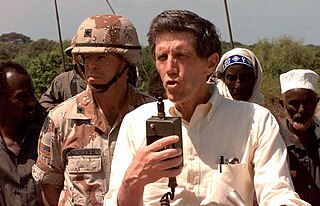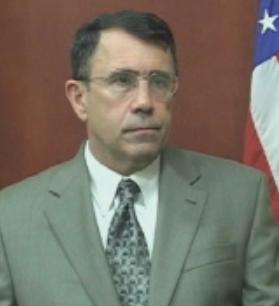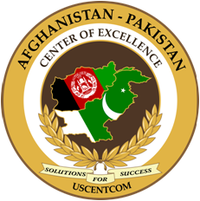
Osama bin Laden was a Saudi Arabian-born Islamist dissident and militant leader who was the founder and first general emir of al-Qaeda. Ideologically a pan-Islamist, he participated in the Afghan jihad against the Soviet Union and supported the activities of the Bosnian mujahideen during the Yugoslav Wars. After issuing his declaration of war against the Americans in 1996, Bin Laden began advocating attacks targeting U.S. assets in several countries, and supervised al-Qaeda's execution of the September 11 attacks in the United States in 2001.

The United States Central Command is one of the eleven unified combatant commands of the U.S. Department of Defense. It was established in 1983, taking over the previous responsibilities of the Rapid Deployment Joint Task Force (RDJTF).

The Inter-Services Intelligence is the largest and best-known component of the Pakistani intelligence community. It is responsible for gathering, processing, and analyzing any information from around the world that is deemed relevant to Pakistan's national security. The ISI reports to its director-general and is primarily focused on providing intelligence to the Pakistani government.
Gary Berntsen is an American former Central Intelligence Agency career officer. During his time at the CIA, he served as a Station Chief on three occasions and led several counterterrorism deployments including the United States’ response to the East Africa Embassy bombings and the 9/11 attacks. He was awarded the Distinguished Intelligence Medal in 2000 and the Intelligence Star in 2004.

Lieutenant General Hamid GulHI(M) SI(M) SBt was a Pakistani three-star general and defence analyst. Gul was notable for serving as the Director-General of the Inter-Services Intelligence (ISI), Pakistan's premier intelligence agency, between 1987 and 1989. During his tenure, Gul played an instrumental role in directing ISI support to Afghan resistance groups against Soviet forces in return for funds and weapons from the US, during the Soviet–Afghan War, in co-operation with the CIA.
On Thursday, 19 January 2006, an audio tape was released, presumably of Osama bin Laden, warning that al-Qaeda was planning more attacks against the United States. The release of the tape came shortly after the United States' Central Intelligence Agency's Damadola airstrike in Pakistan, an attack that reportedly led to the deaths of Midhat Mursi, a veteran bomb and chemical expert and the head of an al-Qaeda training camp on the Afghanistan-Pakistan border, Khalid Habib, the al-Qaeda operations chief for Pakistan and Afghanistan, Abdul Rehman al Magrabi, a senior al-Qaeda operations commander, and 15 other people. Civilians were among the others killed, according to the Pakistani provincial government.
Osama bin Laden, the founder and former leader of al-Qaeda, went into hiding following the start of the War in Afghanistan in order to avoid capture by the United States for his role in the September 11 attacks, and having been on the FBI Ten Most Wanted Fugitives list since 1999. After evading capture at the Battle of Tora Bora in December 2001, his whereabouts became unclear, and various rumours about his health, continued role in al-Qaeda, and location were circulated. Bin Laden also released several video and audio recordings during this time.

Robert Bigger Oakley was an American diplomat whose 34-year career (1957–1991) as a Foreign Service Officer included appointments as United States Ambassador to Zaire, Somalia, and Pakistan and, in the early 1990s, as a special envoy during the American involvement in Somalia.

The Battle of Tora Bora was a military engagement that took place in the cave complex of Tora Bora, eastern Afghanistan, from November 30 – December 17, 2001, during the final stages of the United States invasion of Afghanistan. It was launched by the United States and its allies with the objective to capture or kill Osama bin Laden, the founder and leader of the militant organization al-Qaeda. Al-Qaeda and bin Laden were suspected of being responsible for the September 11 attacks three months prior. Tora Bora is located in the Spīn Ghar mountain range near the Khyber Pass. The U.S. stated that al-Qaeda had its headquarters there and that it was bin Laden's location at the time.

On May 2, 2011, Osama bin Laden, the founder and first leader of the Islamist militant group al-Qaeda, was shot and killed at his compound in the Pakistani city of Abbottabad by United States Navy SEALs of SEAL Team Six. The operation, code-named Operation Neptune Spear, was carried out in a CIA-led mission, with the Joint Special Operations Command (JSOC) coordinating the Special Mission Units involved in the raid. In addition to SEAL Team Six, participating units under JSOC included the 160th Special Operations Aviation Regiment (Airborne), also known as the "Night Stalkers", and the CIA's Special Activities Division, which heavily recruits from former JSOC Special Mission Units. The success of the operation ended a nearly decade-long manhunt for bin Laden, who was accused of masterminding the September 11 attacks on the United States.

The Bin Laden Issue Station, also known as Alec Station, was a standalone unit of the Central Intelligence Agency in operation from 1996 to 2005 dedicated to tracking Osama bin Laden and his associates, both before and after the 9/11 attacks. It was headed initially by CIA analyst Michael Scheuer and later by Richard Blee and others.

Several sources have alleged that the Central Intelligence Agency (CIA) had ties with Osama bin Laden's faction of "Afghan Arab" fighters when it armed Mujahideen groups to fight the Soviet Union during the Soviet–Afghan War.

After the Central Intelligence Agency lost its role as the coordinator of the entire United States Intelligence Community (IC), special coordinating structures were created by each president to fit his administrative style and the perceived level of threat from terrorists during his term.
Pakistan and state-sponsored terrorism refers to the involvement of Pakistan in terrorism through the backing of various designated terrorist organizations. Pakistan has been frequently accused by various countries, including its neighbours Afghanistan, Iran, and India, as well as by the United States, the United Kingdom, Germany, and France, of involvement in a variety of terrorist activities in both its local region of South Asia and beyond. Pakistan's northwestern tribal regions along the Afghanistan–Pakistan border have been described as an effective safe haven for terrorists by Western media and the United States Secretary of Defense, while India has accused Pakistan of perpetuating the insurgency in Jammu and Kashmir by providing financial support and armaments to militant groups, as well as by sending state-trained terrorists across the Line of Control and de facto India–Pakistan border to launch attacks in Indian-administered Kashmir and India proper, respectively. According to an analysis published by the Saban Center for Middle East Policy at the Brookings Institution in 2008, Pakistan was reportedly, with the possible exception of Iran, perhaps the world's most active sponsor of terrorist groups; aiding these groups that pose a direct threat to the United States. Pakistan's active participation has caused thousands of deaths in the region; all these years Pakistan has been supportive to several terrorist groups despite several stern warnings from the international community. Daniel Byman, a professor and senior analyst of terrorism and security at the Center For Middle East Policy, also wrote that Pakistan is probably 2008's most active sponsor of terrorism. In 2018, the former Prime Minister of Pakistan, Nawaz Sharif, suggested that the Pakistani government played a role in the 2008 Mumbai attacks that were carried out by Lashkar-e-Taiba, a Pakistan-based Islamist terrorist group. In July 2019, Pakistani Prime Minister Imran Khan, on an official visit to the United States, acknowledged the presence of some 30,000–40,000 armed terrorists operating on Pakistani soil. He further stated that previous administrations were hiding this truth, particularly from the United States, for the last 15 years during the War on Terror.
For purposes of U.S. foreign policy, South Asia consists of Bangladesh, Bhutan, India, the Maldives, Nepal, Pakistan, and Sri Lanka. The Assistant Secretary of State for South and Central Asian Affairs was Nisha Desai Biswal.
Pakistan's role in the War on Terror is a widely discussed topic among policy-makers of various countries, political analysts and international delegates around the world. Pakistan has simultaneously received allegations of harbouring and aiding terrorists and commendation for its anti-terror efforts. Since 2001, the country has also hosted millions of Afghan refugees who fled the war in Afghanistan.

Derek J. Harvey is a retired US Army Colonel who previously served on the staff of Congressman Devin Nunes, ranking member of the House Permanent Select Committee on Intelligence. Harvey is a former National Security Council (NSC) staffer in President Donald Trump's administration and was the first director of the Afghanistan-Pakistan Center of Excellence at U.S. Central Command (CENTCOM), having been selected by General David Petraeus in 2009 to lead the new organization. Harvey was the previous senior analytical specialist for Iraq to Petraeus, then Commander, Multi-National Forces-Iraq. After being fired from both USCENTCOM and the NSC, he became a top aide to Republican congressman Devin Nunes on the House Intelligence Committee in September 2017. While in this role, Harvey worked to leak the name of the Ukraine whistle-blower, causing concern about their safety and legal protections of whistle-blowers. In 2022, Derek Harvey was elected to serve a four year term on the Board of County Commissioners in Washington County, Maryland. His term expires in 2026.

Pakistan was alleged to have provided support for Osama bin Laden. These claims have been made both before and after Osama was found living in a compound in Abbottabad, Pakistan and was killed by a team of United States Navy SEALs on 2 May 2011. The compound itself was located just half a mile from Pakistan's premier military training academy Kakul Military Academy (PMA) in Abbottabad. In the aftermath of bin Laden's death, American president Barack Obama asked Pakistan to investigate the network that sustained bin Laden. "We think that there had to be some sort of support network for bin Laden inside of Pakistan", Obama said in a 60 Minutes interview with CBS News. He also added that the United States was not sure "who or what that support network was." In addition to this, in an interview with Time magazine, CIA Director Leon Panetta stated that US-officials did not alert Pakistani counterparts to the raid because they feared the terrorist leader would be warned. However, the documents recovered from bin Laden's compound 'contained nothing to support the idea that bin Laden was protected or supported by the Pakistani officials'. Instead, the documents contained criticism of Pakistani military and future plans for attack against the Pakistani military installations.

Pakistan's principal intelligence and covert action agency, Inter-Services Intelligence (ISI), has historically conducted a number of clandestine operations in its western neighbor, Afghanistan. ISI's covert support to militant jihadist insurgent groups in Afghanistan, the Pashtun-dominated former Federally Administered Tribal Areas, and Kashmir has earned it a wide reputation as the primary progenitor of many active South Asian jihadist groups.
The Battle of Jalalabad, also known as Operation Jalalabad or the Jalalabad War, occurred in the spring of 1989, marking the beginning of the Afghan Civil War. The Peshawar-based Seven-Party Union, supported by the Pakistani Inter-Services Intelligence, attacked Jalalabad, which was then under the administration of the Soviet-backed Republic of Afghanistan. Though the mujahideen quickly captured the Jalalabad Airport and Samarkhel, the former base of the Soviet 66th Separate Motorized Rifle Brigade, the Afghan Armed Forces recaptured them and claimed victory.












